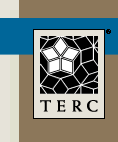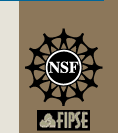 |
|
 |
|

|

About Our Research
Oveview ... Questions ... Design/Methods ... Research Phases ... Findings
With funding from the National Science Foundation, we are conducting a two year research study entitled "A Comparative Study of On-line and Face-to-Face Learning of Try Science." Our goal is to learn as much as we can about the nature of inquiry-based learning in the online environment. Professor Wynne Harlen is the lead researcher on this initiative. Other members of the research team include Katherine Paget and Craig Altobell.
Below is an overview of the research methodology. To see interim progress reports, scroll to the bottom of the page or click on the "Findings" link above. A full copy of the final report, An Investigation of "Try Science" Studied On-Line and Face-to-Face, is also available online.
Research Questions
- What is the nature of the learning experience for students studying on-line?
- What is the nature of the learning experience for students studying in a face-to-face course?
- How do the processes of online learning compare with face-to-face?
- How do the learning outcomes of the on-line course compare with the face-to-face course?
- Are there learning outcomes (both in terms of science and pedagogical understandings) that are more readily achieved through the online course than the face-to-face course, or vice versa?
- What feature of online or regular face-to-face courses might be incorporated into the other to optimize the learning in both forms of the course?
Research Design and Methods
In 2002, we collected comparable data from two groups of teachers, both participants in our Try Science course. One group will took the course online and the other met face-to-face in a conventional classroom.
The data collected from each group included:
- background information (gender, grade taught, teaching experience, other employment, science background, prior computer experience, prione online learning experience);
- activity experience during the course (investigations, reading, group interaction, assignments);
- change in understanding of the science content (through application of understanding in thought experiements and their own self-reported perceptions of change);
- change in understanding of inquiry learning (through pre- and post-course questionnaires and post-course interviews);
- change in understanding about teaching science through inquiry (through pre- and post-course questionnaires and post-course interviews);
- change in classroom practice (through pre- and post-course observation of teaching and post-course interviews);
- change in classroom practice (through pre-and post-course observation of teaching and post-course questionnaires);
Information was also collected from coruse instructors about time spent in different activities, roles, and types of interaction in the two course formats.
|
||||||
Phases of Research
The instruments used in this research have been developed specifically to provide the information needed to answer the research questions. Thus there have been distinct stages of:
- Instrumental development and trials of instruments
- Data collection
- Development of data management procedures (reliability trials of systems for categorizing qualitative data)
- Data analysis
- Using data to address the research questions, including the development of rich descriptions and case studies
Findings
The research is in progress. The following interim report outlines preliminary findings: